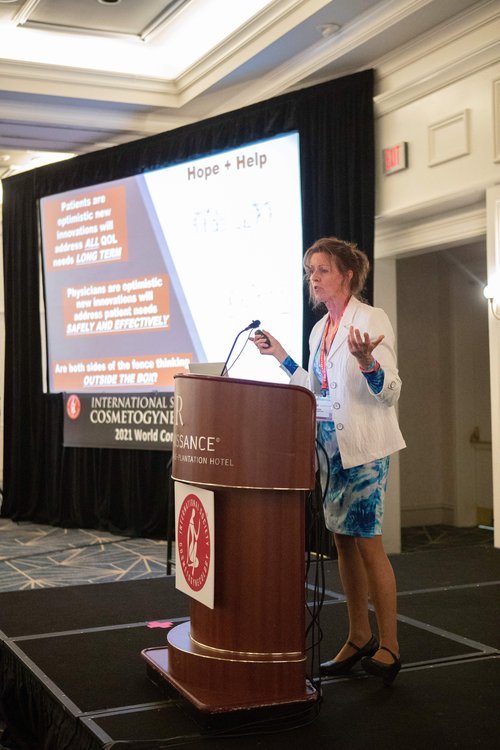
About Our Founder
Meet Sherrie Palm
Founder and CEO of Association for Pelvic Organ Prolapse Support (APOPS), Sherrie “Sher” Palm is a pelvic organ prolapse patient advocate, women’s health activist, award-winning author, and international speaker. Sherrie leads the global charge to destigmatize vaginal health and amplify awareness of pelvic organ prolapse (POP).

From Patient to Patient Advocate
Sherrie’s journey with pelvic organ prolapse began with her own diagnosis in 2007. While researching the condition, Sherrie was shocked to learn that POP has been medically documented for nearly 4,000 years and affects half of all women worldwide — yet research, screening protocol, and support for patients have lagged behind in this space, compared to other health sectors.
Sherrie authored her first book about POP in 2009 in an effort to increase awareness of the condition. As her advocacy journey progressed into activism, Sherrie felt called to further support POP patients and spearhead change in this space. In 2010, she founded APOPS, a 501(c)(3) nonprofit organization and grassroots movement dedicated to eradicating the stigma surrounding pelvic organ prolapse.

“Sherrie Palm is an army trapped in a woman’s body and that army is ignited. She is the passionate and tireless voice of the intimate problems that afflict millions of women, wielding amazing influence within the medical community, the medical industry, and patient groups.”
- Marco Pelosi III, MD

A Voice For Change
Sherrie has presented nationally and internationally to physician, research, academic, corporate, government, and patient audiences since 2011. Her speeches focus on advancing POP awareness, screening, practice, and policy.
Looking for a fervent, compassionate speaker for your next event? Reach out to speak with Sherrie: info.apops@gmail.com

A Letter From Sherrie
From the beginning of this journey, I knew I wanted to connect with women on a deeper level about the impact POP has on all of our lives. Those of us who have already been diagnosed and treated for POP understand the distress women who are newly diagnosed are going through. In the beginning it can be frustrating to dissect the information: Is the data we have access to accurate? Which information applies to us personally? Are treatments or surgery the best path? It takes time to figure out the right course to take.
My vision for APOPS is to connect women who are further down the awareness path with those who are newly diagnosed.
Together we will share information, guidance, and support. Together we will shift the awareness curve by passing on what we learn to the younger generation. Together, we will advance pelvic organ prolapse to be a widely recognized condition that is routinely screened for and researched to evolve treatment options. With your help, we can change the world.
My continuing gratitude to you all!

“With the strength and determination women bring to the table, we will change the mindset of the world at large regarding
pelvic organ prolapse.”
- Sherrie Palm, Founder of APOPS
Sherrie Palm’s Books and Contributions
The Biggest Secret in Women’s Health
Read Sherrie Palm’s latest work on pelvic organ prolapse treatments and insights.
Pelvic Organ Prolapse: The Silent Epidemic
Authored by Sherrie Palm in 2017, read the award-winning book that fueled awareness flames.
Insights Into Incontinence and the Pelvic Floor
Sherrie contributed ch 12, Screening for Ehlers-Danlos Syndrome in the Pelvic Organ Prolapse Patient, in 2022.
The Innovation and Evolution of Medical Devices
Sherrie contributed ch 6, Medical Device Innovation and Errors: The Patient Perspective, in 2019.

“Sherrie’s commitment to de-stigmatizing sexual and pelvic health has created a strong current that is now being felt around the world. The wave of change is coming, and its strongest voice is Sherrie Palm.”
- Suny Caminero, MD









